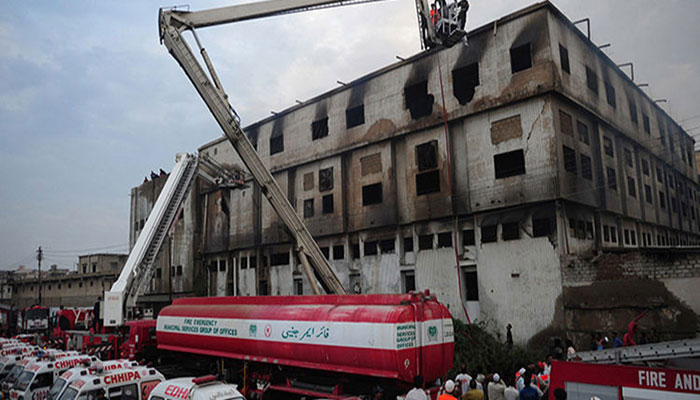SHC moved for retrial of Baldia factory owners, govt officials
Legal heirs of the Baldia fire factory victims on Monday filed an application before the Sindh High Court (SHC) for becoming interveners in the appeals of convicts seeking retrial of the case by implicating factory owners and negligent government officials as accused.
Activists of the Muttahida Qaumi Movement (MQM) Abdul Rehman, alias Bhola, Mohammad Zubair and other factory employees have filed appeals in the SHC against their conviction in the Baldia factory arson attack case.
Rehman and Zubair were sentenced to death while four of the factory's gatekeepers — Shahrukh, Fazal Ahmed, Arshad Mehmood and Ali Mohammad — were sentenced on September 22 to life imprisonment by an anti-terrorism court that found them guilty of charges of murder, extortion, arson and terrorism.
According to the prosecution, the factory was set on fire by MQM leaders and activists over non-payment of Rs250 million in extortion. The main accused, Rehman, had admitted in a confessional statement that the Ali Enterprises garment factory in Baldia Town was set on fire on the order of former MQM Karachi Tanzeemi Committee incharge Hammad Siddiqui for the factory owners’ refusal to pay Rs250 million in extortion. Around 260 factory workers were burnt alive while many others were injured on September 11, 2012, when the factory was set on fire.
Filing an application for becoming interveners in the appeal of the convicts, legal heirs of Baldia factory fire victims, including Husna Khatoon and others, submitted that a criminal case was first initiated against the owners and management of the Ali Enterprises and various government officials.
Their counsel Faisal Siddiqui submitted that the police investigation and FIA reports had identified inadequate safety and firefighting measures in the factory as one of the causes of mass deaths and no attempt was made to extinguish the fire by the factory management.
He submitted that the reports had identified that the two exit doors of the second floor were permanently sealed by the factory owners and management due to the threat of theft and such sealing was fatal as most of the workers were gathered on the second floor because it was a payday and once the electricity went off, it was extremely difficult for the workers to find their way in darkness.
He submitted that the factory, which employed over 1,500 workers and was situated in the biggest industrial area of the city, was neither registered nor inspected for fire safety purposes by the labour department and even the social security department had registered less than 270 workers.
The lawyer submitted that the collusion and negligence of the government departments in the factory fire was obvious and the initial investigation had also concluded that it was an accidental fire either caused by a localised short circuit or by some negligent act of a worker. He added that the investigation had also mentioned that the possibility of mischief could not be ruled out but there was no evidence to suggest that the fire was caused due to any mischief, sabotage or terrorism.
He submitted that police narrative later changed after an MQM activist revealed during interrogation that the inferno at the Ali Enterprises was caused due to the failure to pay extortion money, following which a new investigation team promptly and shockingly declared the owners of the Ali Enterprises factory innocent.
The counsel submitted that the trial court indicted new accused persons for causing the fire by throwing a chemical substance at the factory and the presence of that chemical substance was remarkably discovered by a laboratory test conducted three years after the fire and the extortion was allegedly proven by the payments made by the factory owners to members of the MQM not before but after the fire.
He submitted that the owners and management of the Ali Enterprises factory and the negligent government officials, who were initially nominated as the accused persons in the case, were later removed from the list of the accused persons and made victims and witnesses, after which the trial court handed down death punishment to two of the accused persons and the rest of the four persons were sentenced to life imprisonment.
He submitted that the applicants had filed the application to bring on record that the trial court relied on an illegal and mala fide investigation report to declare the owners of the Ali Enterprises innocent.
The lawyer submitted that the trial was a mistrial, since not all the culprits, especially the main culprits who were the owners and management of the Ali Enterprises factory and the negligent government officials, were tried by the anti-terrorism court and the conviction of the accused persons was based on a mistrial.
The counsel requested the high court to order a retrial of the factory owners and negligent government officials in the Baldia factory fire case by framing charges against them in the trial court. He said that unless the applicant interveners were not made party to the present appeal, not only the personal rights of the applicant interveners would be affected but also justice would not be served to the 264 deceased victims, their families and the 60 injured persons, for the loss of life, emotional trauma, and social and economic stress as a result of the Baldia factory fire.
-
 Amazon Employees’ Break-time Fight Ends In Murder In Texas
Amazon Employees’ Break-time Fight Ends In Murder In Texas -
 Peter Jackson Reveals A Viggo Mortensen Mishap In 'LOTR' Fans Totally Missed
Peter Jackson Reveals A Viggo Mortensen Mishap In 'LOTR' Fans Totally Missed -
 Marsh Farm: Work Underway On Andrew Mountbatten-Windsor's New Home
Marsh Farm: Work Underway On Andrew Mountbatten-Windsor's New Home -
 'Rip' Director Dishes On Matt Damon, Ben Affleck's ‘brotherly’ Dynamic
'Rip' Director Dishes On Matt Damon, Ben Affleck's ‘brotherly’ Dynamic -
 Meghan Markle Handed Strict Warning: ‘You’re Playing With Fire In A High Risk, High Noise’ Game’
Meghan Markle Handed Strict Warning: ‘You’re Playing With Fire In A High Risk, High Noise’ Game’ -
 Paul McCartney Reveals How Close He Came To Giving Up Music
Paul McCartney Reveals How Close He Came To Giving Up Music -
 Kate Middleton’s Secret Message Decoded: ‘She’s Done With All This!’
Kate Middleton’s Secret Message Decoded: ‘She’s Done With All This!’ -
 Police Uncover Secret Cannabis Empire Ran By New York Woman
Police Uncover Secret Cannabis Empire Ran By New York Woman -
 'Euphoria' Season Three Trailer Shows Chaotic Life After High School
'Euphoria' Season Three Trailer Shows Chaotic Life After High School -
 Marisa Abela Opens Up About Impact Of Cancer Treatment On Lifestyle
Marisa Abela Opens Up About Impact Of Cancer Treatment On Lifestyle -
 Kensington Palace Shares Video Of Windsor Castle Ceremony
Kensington Palace Shares Video Of Windsor Castle Ceremony -
 Prince Harry’s Future Inheritance Causes Fears: ‘William Doesn’t Want To Support Meghan’s Ambitions’
Prince Harry’s Future Inheritance Causes Fears: ‘William Doesn’t Want To Support Meghan’s Ambitions’ -
 Gabrielle Union, 53, Delights Fans With Bold Photos
Gabrielle Union, 53, Delights Fans With Bold Photos -
 World's Biggest Fish Market Is Set To Open In Sydney: First Look Revealed
World's Biggest Fish Market Is Set To Open In Sydney: First Look Revealed -
 Ariana Grande, Jonathan Bailey Reuniting For THIS Project
Ariana Grande, Jonathan Bailey Reuniting For THIS Project -
 Sydney Sweeney Saved Herself From Brutal Roast: Here's How
Sydney Sweeney Saved Herself From Brutal Roast: Here's How




